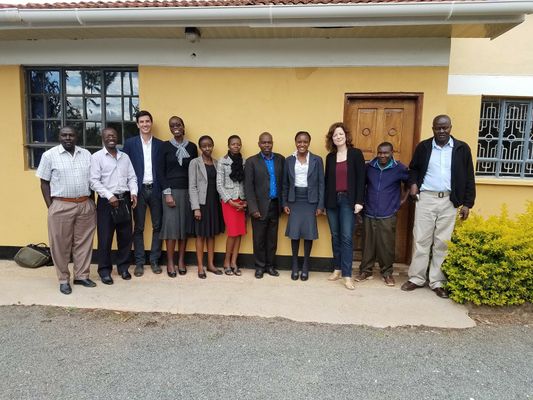We are thrilled to welcome Cari Keller to the Innovations in Healthcare team. Cari is the Assistant Director of Engagement and recently joined our team last October.
As I look back on the last 20 years of my life, I realize I’ve been chasing experiences that would help me answer this question. My recent decision to join Innovations in Healthcare (in October 2016) is the latest such experience in my quest to deepen my innovation practice. In the role of Assistant Director of Engagement, I now have the privilege of overseeing the growth of IiH's diverse network of innovators, partners, and supporters.
I come to IiH from Stanford University, where I ran the Social Entrepreneurship Program at Stanford’s Graduate School of Business. Previous to being a part of the Stanford community, I spent 12 years helping talented changemakers increase the effectiveness of their organizations and programs, first as an entrepreneur working with leaders in the U.S. Federal Government and then as an intrapreneur working with leaders at the United Nations Development Programme (UNDP) in the US, Africa, Eastern Europe, and Asia.
As part of my recent onboarding at Innovations in Healthcare, I had the great fortune of accompanying the Duke Global Health Institute Evidence Lab Team to Nairobi in November, where I had a week-long learning tour focused on the journey from problem to impact. The highlight of the trip for me was sitting in on the Monitoring & Evaluation conversations that Joy Noel Baumgartner, Jennifer Headley and Joe Egger led with six of our network Innovators involved in the Social Entrepreneurship Accelerator at Duke (SEAD) program, including MicroClinic Technologies, Jacaranda Health, LifeNet International, Afya Research Africa, ZanaAfrica, and North Star Alliance. These conversations spanned a wide range of topics (e.g., Theory of Change, data collection and management, quality of care standards, cost effectiveness studies, randomized control trials) and reflected the deep, on-the-ground knowledge and experience of both the Innovator and the Evidence Lab Team.

Above: M&E conversation with the Afya Research Africa Team (including Joy Noel Baumgartner and Jennifer Headley)
As part of my learning tour, I also spent a good chunk of time with the Aspen Network of Development Entrepreneurs (ANDE) and Strathmore Business School Faculty at events where the Evidence Lab introduced an evaluation toolkit that they have designed with and for social enterprises in health in low-resource settings. Three of the tools presented and discussed in detail were:
- Monitoring Organizational Reach and Influence, which provides a systematic way to think about the influential reach of your organization;
- Economic Impact, which helps you choose the type of economic analysis that best suits your needs and helps you measure your economic impact; and
- Measuring Household Out-of-Pocket Health Expenditures, which is an introductory primer on how to measure said expenditures, including common challenges.
What I love about this toolkit is that it is designed to empower entrepreneurs and innovators who are not M&E experts (and may not have such expertise on staff) to make small tweaks to their organizational processes to get to strong(er) impact statements.
By the end of my week in Nairobi, my head and heart were full. Definitely an illuminating experience for this Innovations in Healthcare newbie! And one that brought to mind one of my favorite quotes:
“Life should not be a journey to the grave with the intention of arriving safely in a pretty and well-preserved body, but rather to skid in broadside in a cloud of smoke, thoroughly used up, totally worn out, and loudly proclaiming “Wow! What a ride!” - Hunter S. Thompson

